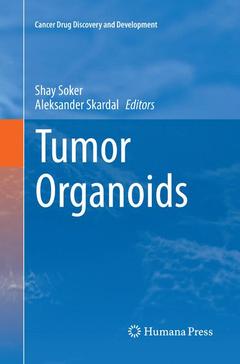Tumor Organoids, Softcover reprint of the original 1st ed. 2018 Cancer Drug Discovery and Development Series
Coordonnateurs : Soker Shay, Skardal Aleksander

Cancer cell biology research in general, and anti-cancer drug development specifically, still relies on standard cell culture techniques that place the cells in an unnatural environment. As a consequence, growing tumor cells in plastic dishes places a selective pressure that substantially alters their original molecular and phenotypic properties.The emerging field of regenerative medicine has developed bioengineered tissue platforms that can better mimic the structure and cellular heterogeneity of in vivo tissue, and are suitable for tumor bioengineering research. Microengineering technologies have resulted in advanced methods for creating and culturing 3-D human tissue. By encapsulating the respective cell type or combining several cell types to form tissues, these model organs can be viable for longer periods of time and are cultured to develop functional properties similar to native tissues. This approach recapitulates the dynamic role of cell?cell, cell?ECM, and mechanical interactions inside the tumor. Further incorporation of cells representative of the tumor stroma, such as endothelial cells (EC) and tumor fibroblasts, can mimic the in vivo tumor microenvironment. Collectively, bioengineered tumors create an important resource for the in vitro study of tumor growth in 3D including tumor biomechanics and the effects of anti-cancer drugs on 3D tumor tissue. These technologies have the potential to overcome current limitations to genetic and histological tumor classification and development of personalized therapies.
Aleksander Skardal, PhD, is Assistant Professor, Regenerative Medicine and Biomedical Engineering, Wake Forest Institute for Regenerative Medicine, Wake Forest School of Medicine.
Highlights the development by the emerging field of regenerative medicine of bioengineered tissue platforms that best mimic the structure and cellular heterogeneity of in vivo tissue
Details how microengineering technologies have resulted in advanced methods for creating and culturing 3-D human tissue--resulting in viability for longer periods of time
Explores the potential of bioengineering and microengineering to aid in overcoming limitations to genetic and histological tumor classification and the development of personalized therapies
Date de parution : 08-2018
Ouvrage de 213 p.
15.5x23.5 cm
Date de parution : 10-2017
Ouvrage de 213 p.
15.5x23.5 cm
Thème de Tumor Organoids :
Mots-clés :
3-D Human Tissue; Anti-Cancer; Drug Development; In Vivo; Organoids; Stroma; Tumor



